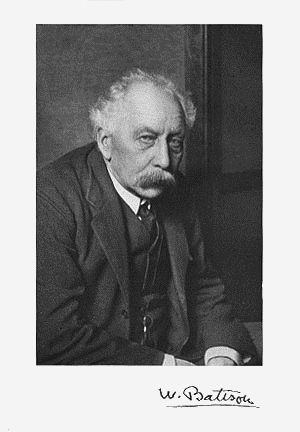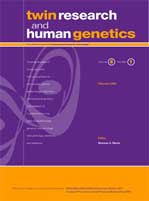Richard Charles Lewontin was an American evolutionary biologist, mathematician, geneticist, and social commentator. A leader in developing the mathematical basis of population genetics and evolutionary theory, he pioneered the application of techniques from molecular biology, such as gel electrophoresis, to questions of genetic variation and evolution.

Lysenkoism was a political campaign led by Soviet biologist Trofim Lysenko against genetics and science-based agriculture in the mid-20th century, rejecting natural selection in favour of a form of Lamarckism, as well as expanding upon the techniques of vernalization and grafting. In time, the term has come to be identified as any deliberate distortion of scientific facts or theories for purposes that are deemed politically or socially desirable.

William Bateson was an English biologist who was the first person to use the term genetics to describe the study of heredity, and the chief populariser of the ideas of Gregor Mendel following their rediscovery in 1900 by Hugo de Vries and Carl Correns. His 1894 book Materials for the Study of Variation was one of the earliest formulations of the new approach to genetics.

Heredity is a monthly peer reviewed scientific journal published by Nature Portfolio. It covers heredity in a biological sense, i.e. genetics. The journal was founded by Ronald Fisher and C. D. Darlington in 1947 and is the official journal of The Genetics Society. From 1996 the publishing was taken over by Nature Portfolio. The editor-in-chief is Sara Goodacre.
Genetic genealogy is the use of genealogical DNA tests, i.e., DNA profiling and DNA testing, in combination with traditional genealogical methods, to infer genetic relationships between individuals. This application of genetics came to be used by family historians in the 21st century, as DNA tests became affordable. The tests have been promoted by amateur groups, such as surname study groups or regional genealogical groups, as well as research projects such as the Genographic Project.
T.C. Hsu, was a Chinese American cell biologist. He was the 13th president of American Society for Cell Biology, and known as the Father of Mammalian Cytogenetics.
PLOS Genetics is a peer-reviewed open access scientific journal established in 2005 and published by the Public Library of Science. The founding editor-in-chief was Wayne N. Frankel. The current editors-in-chief are Gregory S. Barsh and Gregory P. Copenhaver. The journal covers research on all aspects of genetics and genomics.

Adam Guy Riess is an American astrophysicist and Bloomberg Distinguished Professor at Johns Hopkins University and the Space Telescope Science Institute. He is known for his research in using supernovae as cosmological probes. Riess shared both the 2006 Shaw Prize in Astronomy and the 2011 Nobel Prize in Physics with Saul Perlmutter and Brian P. Schmidt for providing evidence that the expansion of the universe is accelerating.

The American Journal of Human Genetics is a monthly peer-reviewed scientific journal in the field of human genetics. It was established in 1948 by the American Society of Human Genetics and covers all aspects of heredity in humans, including the application of genetics in medicine and public policy, as well as the related areas of molecular and cell biology. According to the Journal Citation Reports, the journal has a 2019 impact factor of 10.502. The journal is published by Cell Press an imprint of Elsevier. Bruce R. Korf became the editor-in-chief in the winter of 2017–2018.

Elaine V. Fuchs is an American cell biologist famous for her work on the biology and molecular mechanisms of mammalian skin and skin diseases, who helped lead the modernization of dermatology. Fuchs pioneered reverse genetics approaches, which assess protein function first and then assess its role in development and disease. In particular, Fuchs researches skin stem cells and their production of hair and skin. She is an investigator at the Howard Hughes Medical Institute and the Rebecca C. Lancefield Professor of Mammalian Cell Biology and Development at The Rockefeller University.
Genes, Brain and Behavior is a peer-reviewed online-only scientific journal covering research in the fields of behavioral, neural, and psychiatric genetics. It is published by Wiley-Blackwell on behalf of the International Behavioural and Neural Genetics Society. The journal was established in 2002 as a quarterly and is currently published monthly. G2B is a hybrid open access journal, but two years after publication all content is available for free online.

Swansea University Medical School is a medical school on Swansea University's Singleton campus. It is linked to additional teaching centres located throughout South and West Wales, including Cefn Coed Hospital, Singleton Hospital and Morriston Hospital in Swansea, Prince Philip Hospital in Llanelli, Withybush General Hospital in Haverfordwest and Bronglais Hospital in Aberystwyth. The Medical School also has a network of primary care teaching centers.

Twin Research and Human Genetics is a peer-reviewed scientific journal published bimonthly by the Cambridge University Press. It is the official journal of the International Society for Twin Studies (ISTS) and the Human Genetics Society of Australasia. The journal covers research on the biology and epidemiology of twinning as well as biomedical and behavioral twin- and molecular-genetic research. According to the Journal Citation Reports, it has a 2018 impact factor of 1.159. The journal was established in 1998 and has been edited by Robert Derom (1998–1999), and Nick Martin (2000–present). The title is a translation of Acta Geneticae Medicae et Gemellologiae, from 1952 until 1978 the official organ of the Permanent Committee for the International Congresses of Human Genetics and Società italiana di genetica medica, the original title of the first journal of the ISTS.

The Journal of Human Genetics is a monthly peer-reviewed scientific journal covering all aspects of human genetics and genomics. It was established in 1956 as the Japanese Journal of Human Genetics and was independently published by the Japan Society of Human Genetics. It obtained its current name in 1992. According to the Journal Citation Reports, Journal of Human Genetics has a 2020 impact factor of 3.172.

Human Mutation is a peer-reviewed medical journal of human genetics published by Wiley-Liss on behalf of the Human Genome Variation Society. It first appeared in 1992. The founding editors-in-chief were Haig H. Kazazian and Richard G.H. Cotton. Cotton served until his death in 2015, latterly with Garry R. Cutting, who became sole EIC.

Adam David Rutherford is a British geneticist and science populariser. He was an audio-visual content editor for the journal Nature for a decade, and is a frequent contributor to the newspaper The Guardian. He hosts the BBC Radio 4 programmes Inside Science and The Curious Cases of Rutherford and Fry; has produced several science documentaries; and has published books related to genetics and the origin of life.
CBE: Life Sciences Education is an online, quarterly journal owned and published by the American Society for Cell Biology, with funding from Howard Hughes Medical Institute. The journal publishes peer-reviewed articles on life sciences education research and evidence-based practice at the K-12, undergraduate, and graduate levels. One goal of the journal is to encourage teachers and instructors to view teaching and learning the way scientists view their research, as an intellectual undertaking that is informed by systematic collection, analysis, and interpretation of data related to student learning. Target audiences include those involved in education in K-12 schools, two-year colleges, four-year colleges, science centers and museums, universities, and professional schools, including graduate students and postdoctoral researchers. All published articles are available freely online without subscription. In addition, published articles are indexed in PubMed and available through PubMed Central. The journal's 2018 impact factor was 2.380.
Epigenetics is a monthly peer-reviewed scientific journal covering research pertaining to epigenetics. It was established in 2006 and published by Landes Bioscience, until this company was acquired by Taylor & Francis in 2014. It is the official journal of the Epigenetics Society. The editor-in-chief is Manel Esteller.
Adam C. Eyre-Walker, is a British evolutionary geneticist, currently Professor of Biology in the School of Life Sciences at the University of Sussex. He is noted for making "significant contributions to our understanding of evolution at the molecular level" and pioneering the use of DNA sequence databases for extracting information about the evolution of genomes.










